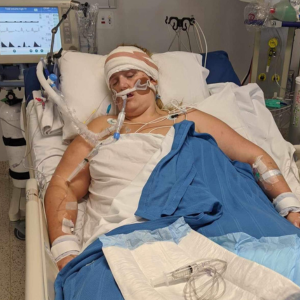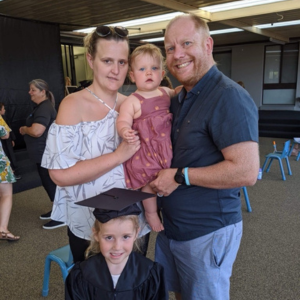12 Jun Rebecca’s story: The Impact of Acoustic Neuroma
Acoustic neuroma is a type of benign brain tumour that grows on the nerve connecting the inner ear to the brain. It can affect your hearing and balance, causing symptoms like dizziness, tinnitus, or hearing loss. Due to the location of the tumour, treatment with surgery or radiation can be complex.
Rebecca Gauci has lived with the impacts of acoustic neuroma since her diagnosis in August 2020. This disease has turned her life upside down, involving multiple rounds of complicated treatment and countless tests. She is still uncertain what the future holds.
Stories like Rebecca’s highlight the critical significance of the work we do. Research stands as the beacon of hope, offering the promise of enhanced treatments and brighter patient outcomes. Please consider making a donation to support research today >
Following the birth of her second daughter in February 2020, Rebecca began experiencing some alarming symptoms: numbness on the left side of her face, dizziness, and balance issues. Initially attributing these to postpartum fatigue, she brushed them off. Even after consulting with a local GP, her concerns were dismissed as mere fatigue. It wasn’t until her daughter’s six-month check-up in August that she insisted on further investigation with her regular GP, leading to an MRI that revealed a sizable acoustic neuroma.
“The diagnosis was a life-altering moment, and I grappled with fears about surgery, potential complications, and the impact on my family.”
Rebecca underwent surgery at the end of 2020. The surgery was estimated to take 9 hours, the procedure stretched into a gruelling 21.5 hour ordeal. The tumour proved to be more complex than anticipated and was entwined in her brain stem. Post-surgery, she endured five challenging days in ICU, relearning basic functions like walking, talking, and eating. Though she eventually transitioned to a regular ward, the recovery journey was far from over.


Despite the hopeful stability of her postoperative scans in February 2021, the crushing blow came with subsequent scans in June 2021, which unveiled significant tumour growth. Rebecca faced another daunting chapter, enduring 28 days of radiation therapy. Amidst the haze of the second lockdown, her daily routine became a balancing act, juggling early-morning radiation sessions, homeschooling her eldest, and battling through the relentless onslaught of side effects – nausea, dizziness, and crippling fatigue.
The radiation experience exposed her to the resilience of fellow patients but took a toll on her body. The tumour continues to impact her balance, speech, and facial muscles, and her medical team has been continuously monitoring her condition. Her scans in the past year have shown both growth and stability, bringing a mix of worry and uncertainty. The latest scan at the end of 2023 indicated stability, but the future remains uncertain. The neurosurgeon may recommend further surgery or radiation if the tumour continues to grow.
“Living with the persistent impact of the tumour on my daily life, I face uncertainty about future interventions. However, with continuous monitoring and the guidance of my dedicated medical team, I approach each day with a focus on the present and the strength to confront whatever lies ahead, one step at a time.”
Research provides a beacon of hope
Currently, there are no targeted treatments for acoustic neuroma, nor are there drug therapies to slow tumour growth or prevent tumour regrowth after surgical removal. However, in our 2022 round of Research Grants, we funded a study that holds promise. Associate Professor Rebecca Lim identified an antibody capable of slowing tumour growth in cultured cells. You can delve deeper into her research on our website >
A/Prof Lim’s findings will need further research before this treatment becomes available for patients. Yet, if successful, it could revolutionise the lives of individuals like Rebecca.
Please help us in funding research by making a donation today. Your support is invaluable and will impact countless lives.


 The Brain Foundation is the largest, independent funder of brain and spinal injury research in Australia. We believe research is the pathway to recovery.
The Brain Foundation is the largest, independent funder of brain and spinal injury research in Australia. We believe research is the pathway to recovery.